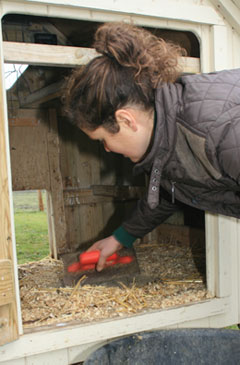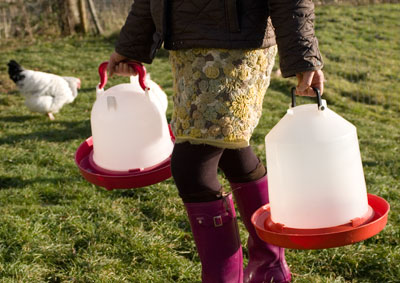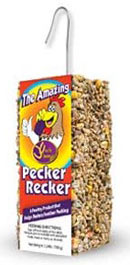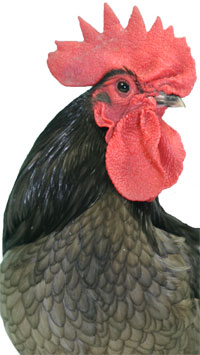Stress is a major contributor to ill health in chickens and can also make them more prone to a number of vices such as feather picking, egg eating, comb or vent pecking.
Chickens kept in intensive conditions are constantly subjected to stress which is why farmers see such high mortality rates and have to pay out to keep birds healthy and make them productive. Fortunately, keeping chickens in our back garden isn’t exactly intensive as long as they have a sufficiently large run or are let out of their run regularly to free-range although there are pleanty of other times when chickens can suffer from stress.
In short, stress is best avoided whenever possible and a little bit of care and forethought can dramatically reduce stress in your birds.
So how do we know what stresses chickens? Well, some years ago, there were studies done that measured the stress hormone ‘corticosterone’ of birds in different situations and it is this research that has enabled us to understand the stressors.
Stressors.
As well as intensive conditions causing stress, the other main stressors can seem quite trivial to us.
- Handling. This is one of the biggest stressors. Chickens are a prey species so naturally, if caught and picked up, they become stressed. Whilst regular handling is important for health checks, chasing a bird around a run for 5 minutes every time will not help. Try to catch birds in a confined area such as a house quickly and calmly. Hold the wings firmly and then transfer the bird to the holding position with your right hand underneath her, breast in the palm of your hand, fingers holding the tops of the legs. Her head should be underneath your arm so her head is looking behind you. Use your left hand to examine her.
- Introducing new chickens. Chickens are flock animals that have a pecking order. It is thought the ancestors to our chickens, the Red Jungle Fowl of South East Asia use the pecking order to assist in their survival. If every bird has her place, when it comes to feeding time, each one can have her turn and they don’t have to spend precious time arguing which may alert predators to their where-abouts. Every hen knows her place in the pecking order and by introducing new birds, the pecking order is upset. No hen knows where she stands and this will cause arguments and considerable stress for days until they have sorted themselves out into a ‘new flock’.
- Lack of food or water. This stress is completely avoidable of course but we all have those one off days when we suddenly realise that our birds have run out of water for one reason or another. A leaky water container, frozen water or just a forgetful moment!
- Extreme heat. Chickens don’t sweat. To cool down, a chicken must either take on cool water (and excrete more to lose the excess fluids and some heat) or pant which removes heat through the air they exhale. Chickens are much better equipped to deal with the cold and can keep their body temperature up by eating more and trapping air inside their feathers to insulate themselves thermally. Heat will cause chickens to become stressed.
- A new environment. This can be taking a bird to a show, getting your birds for the first time or just moving them to a different house or run. Another environmental change that is hard to avoid but causes considerable stress for your birds is when there has been a covering of snow.
- Egg laying. This is surprising since this is a natural things that chickens do but egg laying does cause stress on your hens. Giving them a peaceful, private, darkened nest box can help. Try not to disturb hens that are in the process of laying.
- Predation. Foxes or other predators visiting the garden on a regular basis are likely to cause stress. In the extreme case, after a fox attack, even though a chicken may survive the wounds inflicted by a fox (he grabs a mouth full of her feathers for example and the chicken escapes), she can still die because of the stress.

If you can minimise stress, your birds will be less prone to picking up disease which is something we would all like: happy, healthy chickens!






Hi my 2 week old chick has started to bury herself with the bedding, it warm enough for her and the other 3 chicks seem to be ok and not doing this any thoughts?
Is she just trying to have a dust bath?
If she’s cold, she would be standing directly under the lamp all the time.
hi i have pekin bantams all i have been told girls but one was given to me as a runt it grew very slow its now looking beautiful and is approx 8 months old has quite a large comb and wattles bright red, it is trying to become quite dominant has not laid any eggs which is fine they all have their own pace, nut i am concerned as it resembles a cockerel but i cant see any spurs we have had some odd noises but no crowing but it also has started imitating [i hope] mating with one hen in particular is this just dominance towards this hen or could it be a slow developing cockerel? i would appreciate your view, thanks pip
I’m afraid it sounds like a cock-a-doodle do to me…
Hi I have 3 chickens, Hoppy and carrot (named by my grandchildren) have been pecking cluck, who used to peck Hoppy, now they will not let cluck eat or drink I have to put another dish down for her and stand with her while she eats or she get nothing, she seems sad and stands on her own most of the day, is there anything I can do?
Unfortunately not. There will always be one at the bottom of the pecking order. What you should do is make sure she is feeding and drinking. This can be done by ensuring there are 2 sources of food and water or enough space and ad-lib food so that she can feed when the other two aren’t near.
One of my chickens got a little chewed by our dog three days ago, there were a few feathers around but no blood as we got to her pretty quickly. The first two days after the episode, she was quite subdued, but came out of her house was eating and drinking (no scratching though). Today she won’t come out of her coop and is very quiet. I have put water and food in there for her. Is there anything else I can do for her, as am a complete novice. thanks
Are you sure there are no puncture wounds? If so, she could have infection which will cause this. ACV in the water is good for stress.
i have been told to keep empty eggshells and bake them then crush them and put these in with their food in order for them to help make strong shells when laying
Yes you can. I don’t because it’s more work when Oyster shell is so cheap.